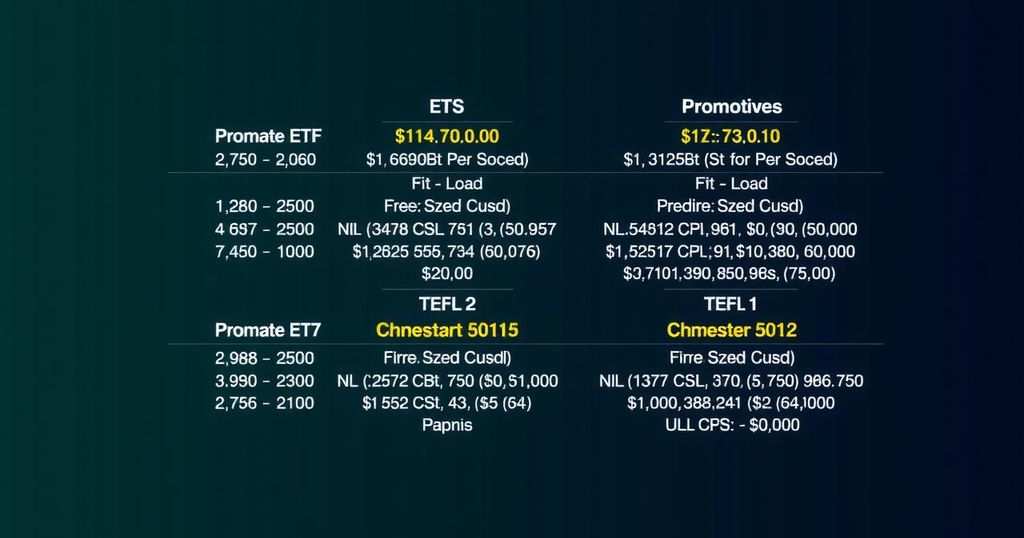Understanding Bitcoin ETFs: Types, Fees, and Implications
On January 10, 2024, the U.S. Securities and Exchange Commission (SEC) granted approval for the first spot Bitcoin exchange-traded funds (ETFs), including offerings from prominent firms such as Fidelity, BlackRock, and Invesco. This landmark decision allows these funds to directly hold Bitcoin, thereby providing investors with a new pathway to gain exposure to the cryptocurrency market.
A spot Bitcoin ETF is characterized as an exchange-traded fund that closely tracks the price of Bitcoin throughout the trading day, akin to trading a stock. This type of ETF directly holds the cryptocurrency, contrasting with previous Bitcoin investment vehicles that primarily focused on futures contracts or related equities. Notably, until this approval, while there were various cryptocurrency-related ETFs and trusts, no spot Bitcoin ETF had been available for trading on major exchanges.
The following is a list of the eleven most prominent spot Bitcoin ETFs ranked by management fees, from lowest to highest:
1. **Franklin Templeton Digital Holdings Trust (EZBC)** – 0.19%
2. **Bitwise Bitcoin ETF (BITB)** – 0.20%
3. **VanEck Bitcoin Trust (HODL)** – 0.20% (Waived until March 31, 2025 or until the fund reaches $1.5 billion in assets)
4. **Ark 21Shares Bitcoin ETF (ARKB)** – 0.21%
5. **iShares Bitcoin Trust (IBIT)** – 0.25% (Reduced to 0.12% until January 11, 2025, or until $5 billion in assets)
6. **Fidelity Wise Origin Bitcoin Fund (FBTC)** – 0.25%
7. **WisdomTree Bitcoin Fund (BTCW)** – 0.25%
8. **Invesco Galaxy Bitcoin ETF (BTCO)** – 0.25%
9. **Valkyrie Bitcoin Fund (BRRR)** – 0.25%
10. **Hashdex Bitcoin ETF (DEFI)** – 0.90%
11. **Grayscale Bitcoin Trust (GBTC)** – 1.50%
Although these ETFs are designed to closely track the price of Bitcoin, it remains essential for investors to understand that they may not always reflect identical returns to the cryptocurrency itself.
Additionally, investment products known as Bitcoin strategy ETFs have been available prior to the approval of spot Bitcoin ETFs. These funds aim to indirectly track Bitcoin’s price by investing in Bitcoin futures or mining stocks, thus exhibiting more volatility in performance compared to direct holdings.
The following is a list of the eight Bitcoin strategy ETFs, ranked by fee from lowest to highest:
1. **Global X Blockchain & Bitcoin Strategy ETF (BITS)** – 0.65%
2. **Valkyrie Bitcoin Miners ETF (WGMI)** – 0.75%
3. **Bitwise Bitcoin Strategy Optimum Roll ETF (BITC)** – 0.92%
4. **ProShares Bitcoin Strategy ETF (BITO)** – 0.95%
5. **Bitwise Bitcoin and Ether Equal Weight Strategy ETF (BTOP)** – 0.95%
6. **Valkyrie Bitcoin and Ether Strategy ETF (BTF)** – 1.24%
7. **ProShares Bitcoin & Ether Market Cap Weight Strategy ETF (BETH)** – 1.33%
8. **ProShares Bitcoin & Ether Equal Weight Strategy ETF (BETE)** – 1.33%
These ETFs predominantly invest over fifty percent of their non-cash-equivalent holdings into Bitcoin futures or mining-related equities. The recent surge in filings for spot Bitcoin ETFs and the ensuing competition among issuers has led to a significant reduction in fees and promotional offers aimed at attracting investors.
A significant consideration for potential investors is the custodianship risk associated with Bitcoin ETFs. Most spot Bitcoin ETFs engage third-party custodians to secure the Bitcoin they hold. A striking example is Coinbase, which acts as the custodian for eight of the ten active spot Bitcoin ETFs. This exclusivity raises concerns regarding the safety of assets should Coinbase experience financial turmoil, cyber threats, or regulatory penalties. While there are recovery mechanisms in place, they may not guarantee immediate or uncomplicated access to holdings in such scenarios.
The ramifications of the SEC’s approval extend beyond just facilitating investments in Bitcoin. Financial professionals, such as Peter Eberle, Chief Investment Officer at Castle Funds, have expressed optimism that the introduction of these ETFs could increase demand for Bitcoin, especially among institutional investors who traditionally face barriers to direct cryptocurrency investments. However, caution is urged as the anticipated activity may not translate to immediate substantial inflows.
Furthermore, the authorization of Bitcoin spot ETFs may have a knock-on effect in the broader cryptocurrency market. Given the historical correlation between Bitcoin and other cryptocurrencies, considerable movements in Bitcoin prices are likely to influence the performance of alternative digital assets. Industry experts suggest that the favorable regulatory stance towards Bitcoin could pave the way for Ethereum ETFs, potentially further enhancing interest and investment in the crypto space.
In conclusion, the SEC’s recent approvals for spot Bitcoin ETFs represent a noteworthy advancement in the cryptocurrency investment landscape, providing both institutional and individual investors with improved access and diversified investment options. Nevertheless, diligence in understanding the associated risks, as well as continuous monitoring of market conditions, remains imperative for investors considering these emerging financial products.








Post Comment